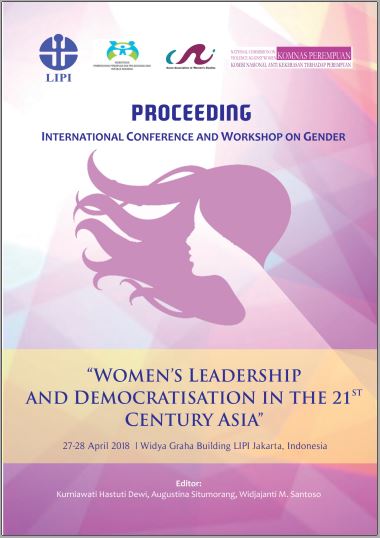Female Workers Versus Family Leadership In The Muslim Community
Abstract
Modernity has posed challenges for female workers. On one hand, - modernity provided an opportunity of full employment for women, on the other hand, it may triggered issue on the division of gender roles in the family. Interestingly, this issue not only objected by men, but also is questioned by women. Even if a wife is working and the husband is not, the public often remains putting men as the leader of the family, i.e., a husband is considered as a sole decision maker in the family, without asking a wife’s opinion. Female workers are still considered inferior and such a view has put wife in disadvantaged position. This issue needs to be addressed properly, in order to give benefits for both husband and wife in a family. To do so, in Islam we do not need to be stuck on the concept of male-female power relationship, the important issu is the main goal of a family relation should end with saki>nah, mawaddah, and rah}mah. Considering the fact that a family is a nation capital, a family living in saki>nah, mawaddah and rah} mah is a decisive for creating a peaceful and harmonious society. The term “harmony” does not mean a lazy life without any progressive target, rather a harmonious family which is far from domestic violence. Therefore it is necessary to reformulate fiqh dealing with family leadership. How should fiqh solve this problem? This question is then further discussed and analyzed.
Downloads
References
Fitria Zelfis. Bukan Perempuan Biasa. Yogyakarta: Buku Pintar; 2013, p. 13
Felix M. Beardo, Constance L Shehan. Family Problems in Global Perspective. In: George Ritzer, editor.Handbook of Social Problems: A Comparative International Perspective, Thousand OaksLondon-New Delhi: SAGE Publications; 2004, p. 248.
‘Abd al-Kari>m Zaida>n. al-Waji>z fi> Us}u>l al-Fiqh. 6th ed. Baghda>d: Maktabah alBasha>ir; 1976, p. 155-156.
Jasser Auda. Maqasid al-Shariah as Philosophy of Islamic Law: A System Approach. London and Washington: The International Institute of Islamic Thought; 2007, p. xxii.
Jaih Mubarok. Dinamika Pemikiran Hukum Islam di Indonesia. UNISIA; No. 48/XXVI/II/2003. Yogyakarta: UII; 2003, p. 113.
Jasser Auda.Maqasid al-Shariah as Philosophy of Islamic Law: A System Approach. London and Washington: The International Institute of Islamic Thought; 2007, p. xxiv.
Asmuni M.Th. Penalaran Induktif dan Perumusan al-Maqasid Syatibi Menuju Ijtihad yang Dinamis. UNISIA; No. 48/XXVI/II/2003. Yogyakarta: UII; 2003, p. 172-174.
Jasser Auda.Maqasid al-Shariah as Philosophy of Islamic Law: A System Approach, London and Washington: The International Institute of Islamic Thought, 2007, p. 197-198.
M. Amin Abdullah. Pengantar. In: Jasser Auda.Membumikan Hukum Islam Melalui Maqasid Syariah. Translated by Rosidin and ‘Ali ‘Abd el-Mun’im. Bandung: PT. Mizan Pustaka; 2015, p. 11.
Jasser Auda. Maqasid al-Shariah as Philosophy of Islamic Law: A System Approach. London and Washington: The International Institute of Islamic Thought; 2007, p. 244.
Ah}mad al-Raysuni>. Fiqh al-Thaurah: Mura>ja’a>t fi> al-Fiqh al-Siya>si al-Isla>mi. Kairo: Da>r al-Kalimah; 2012, p.11-12.
https://akhiahmadhafis.wordpress.com/2015/01/17/idealisme-dan-hubungan-sosial/, accessed on February 12th, 2018.
John B. Thompson. Analisis Ideologi Dunia. Translated by Haqqul Yaqin. Yogyakarta: IRCiSoD, 2014; p.11.
http://slideplayer.info/slide/12275409/, accessed on February 12th, 2018.
https://www.slideshare.net/SaddamTjahyo/mengenal-ideologi-besar-dunia-oleh-saddamcahyo, accessed on February 12th, 2018.
Sylvia Duarte Dantas DeBiaggi. Changing Gender Roles: Brazilian Immigrant Families in the U.S.Carola Suárez-Orozco, Marcelo Suárez-Orozco, editors. New York: LFB Scholarly Publishing LLC; 2002, p. 45.
‘Abd al-Kari>m Zaida>n. Al-Waji>z fi> Us}u>l al-Fiqh. 6th ed. Baghda>d: Maktabah alBasha>’ir; 1976, p.292.
Wahbah al-Zuh}aili>. Us}u>l al-Fiqh al-Isla>mi>. 20th ed. Bairu>t: Da>r al-Fikr, 2013; p. 67.
‘Abd al-Kari>m Zaida>n.Al-Waji>z fi> Us}u>l al-Fiqh. 6th ed. Baghda>d: Maktabah alBasha>’ir; 1976, p. 34-35.
M. Quraish Shihab.Untaian Permata buat Anakku, 2nd ed. Bandung: Al-Bayan; 1997, p. 80-81.
Ulin Na’mah.Cerai Talak: Maknanya bagi Pelaku Matrilocal Residence di Lingkungan Masyarakat Muslim, Yogyakarta: Pustaka Pelajar; 2015, p. 35.
Masya’ Allah. Guru TPP Banyak Ajukan Gugat Cerai. In: www.kedirijaya.com/.../masyaallahguru-tpp-banyak-ajukan-gugat-c..., accessed on February 15th , 2012 DRAFT - PLEASE DO NOT QUOTE OR CITE
http://kstv.co.id/berita-kstv/pns-wanita-ramai-ajukan-perceraian.html , accessed on February 15th , 2012.
http://bonansafm.com/2011/10/marak-guru-profesional-gugat-cerai-suami.html , accessed on February 15th , 2012.
www.kedirijaya.com/.../masyaallah-guru-tpp-banyak-ajukan-gugat-c..., accessed on February 15th , 2012.
Tunjangan Sertifikasi Bisa Picu Perceraian. Jawa Pos: Radar Kediri, 27 Nopember 2012, p.33.
Ulin Na’mah. Makna Perempuan Karir dalam Konteks Relasi Suami-Istri bagi Perempuan Pengaju Cerai Gugat di Kediri. Realita, Vol. 11 No. 2 July 2013, Kediri: LP3M STAIN Kediri; 2013.
Endang Sulistyaningsih, Hariyani Rumondang. Perempuan di Dunia Kerja. In: Sulistyowati Irianto, editor.Perempuan dan Hukum: Menuju Hukum yang Berperspektif Kesetaraan dan Keadilan. Jakarta: Yayasan Obor Indonesia; 2008, p. 442.
Nani Zulminarni. Dunia Tanpa Suami: Perempuan Kepala Keluarga sebagai Realitas yang Tidak Tercatat. Jurnal Perempuan, Vol. 73, 1st ed., 2012. Jakarta Selatan: Yayasan Jurnal Perempuan; 2012, p. 52.
Jane Ardaneshwari, Potret Dilema Perempuan Bekerja dalam Media Perempuan Indonesia. Jurnal Perempuan, Vol. 76, 1st ed., 2013. Jakarta Selatan: Yayasan Jurnal Perempuan; 2013, p. 25.
Nani Zulminarni. Dunia Tanpa Suami: Perempuan Kepala Keluarga sebagai Realitas yang Tidak Tercatat. Jurnal Perempuan, Vol. 73, 1st ed., 2012. Jakarta Selatan: Yayasan Jurnal Perempuan; 2012, p. 53.
Istri Pencari Nafkah. Swara Rahima, Vol. 4, II, February 2001. Jakarta: Yayasan Rahima; 2001, p.
Herman Arisandi, Buku Pintar: Pemikiran Tokoh-tokoh Sosiologi dari Klasik sampai Modern, Yogyakarta: IRCiSoD; 2015, p. 68-71.

Copyright (c) 2019 Ulin Namah

This work is licensed under a Creative Commons Attribution-ShareAlike 4.0 International License.





